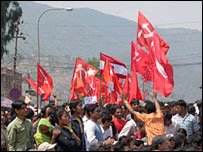Nepalese Rebels Declare Three-Month Truce After Ending Blockade
 Bloomberg
BloombergApril 27 (Bloomberg) -- Rebels in Nepal declared a three- month cease-fire after ending a blockade of Kathmandu imposed to support a two-week general strike that forced King Gyanendra to reinstate Parliament.
The truce is to help the ``people's struggle'' for a new assembly to be elected to draft a new constitution, Pushpa Kamal Dahal, the rebel leader known as Prachanda, said in a statement issued late yesterday, Nepalnews.com reported.
The cease-fire will come into effect immediately and will allow political parties to arrange for elections for the new assembly, Prachanda said.
King Gyanendra imposed a state of emergency in February 2005 after dismissing the government for failing to control a 10-year insurgency by rebels fighting to replace the monarchy with a communist republic. Protests organized by a seven-party opposition alliance culminated in this month's general strike and rallies that brought daily confrontations between demonstrators and security forces.
The king said in an national address three days ago that Parliament will convene on April 28.
The rebel Communist Party of Nepal (Maoist) supported the protests by blockading main roads in the country. It ended the road blocks yesterday after an appeal by Girija Prasad Koirala, president of the Nepali Congress, Nepal's largest party and a member of the opposition alliance.
The opposition has nominated Koirala as prime minister of an interim government that will be installed when Parliament meets.
King's Powers
The opposition parties and the rebels reached an agreement last November to press for democracy and curb the powers of the king. The insurgency in the Himalayan kingdom of 27 million people has cost the lives of 13,000 people since 1996.
The country's constitution was changed in 1990, creating a multiparty system, further weakening the
 power of the monarchy after the introduction of a non-party political system in 1960.
power of the monarchy after the introduction of a non-party political system in 1960.State-of-emergency regulations introduced in 2005 restricted political parties and the media and were denounced by the international community led by the United Nations, the U.S. and neighboring India. King Gyanendra said at the time he would hold parliamentary elections by April 2007.
Nepal's economy, which depends on tourism for foreign exchange, has been damaged by the strike and the insurgency. Agriculture accounts for 40 percent of gross domestic product and provides a livelihood for 80 percent of Nepal's population. An estimated 40 percent of Nepalese live below the poverty line.
The country is home to Mount Everest, the tallest peak, which attracts climbers from around the world and is reputed to be the birthplace of the Buddha.
To contact the reporter for this story:
Paul Tighe in Sydney at ptighe@bloomberg.net

0 Comments:
Post a Comment
<< Home